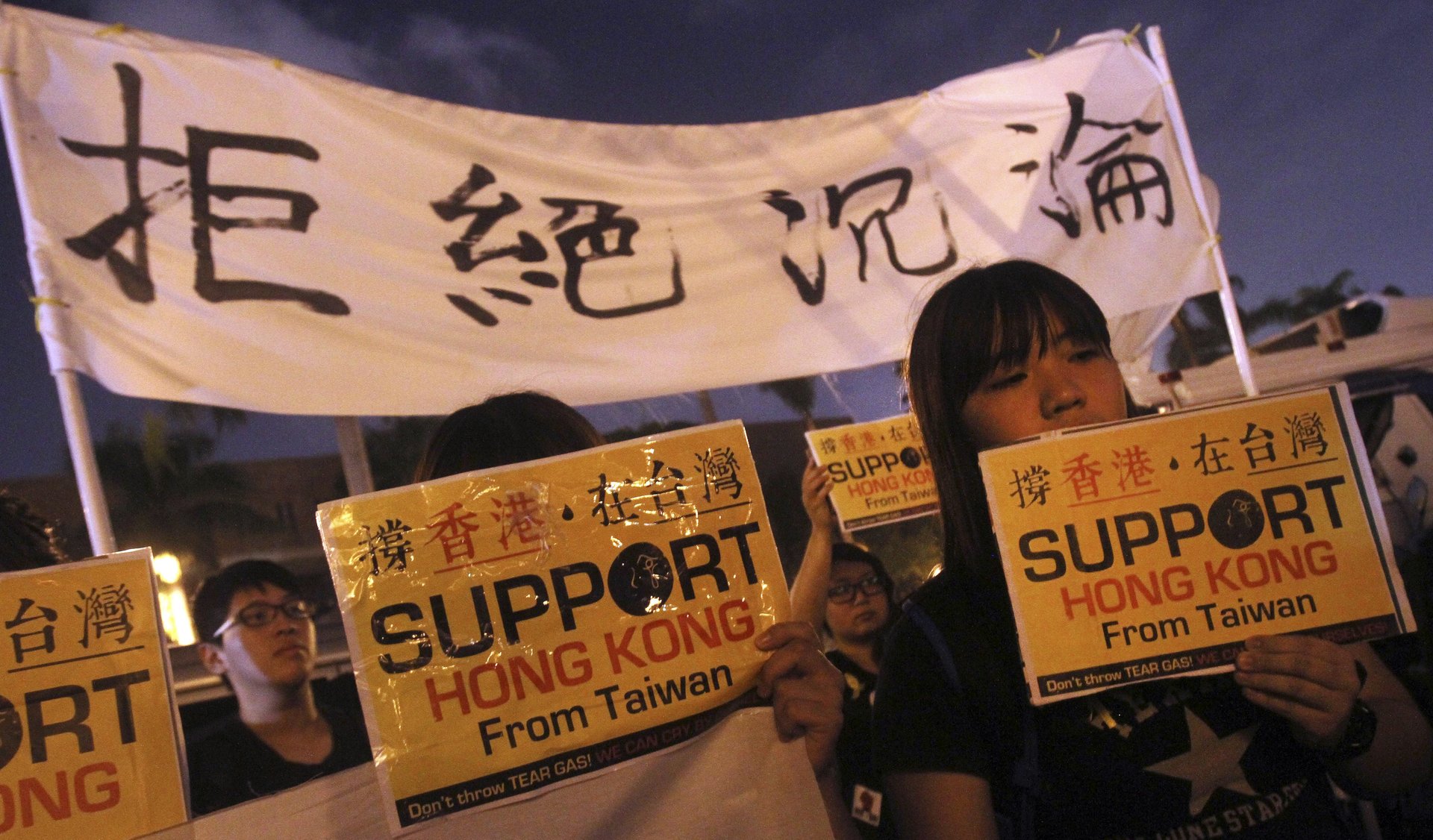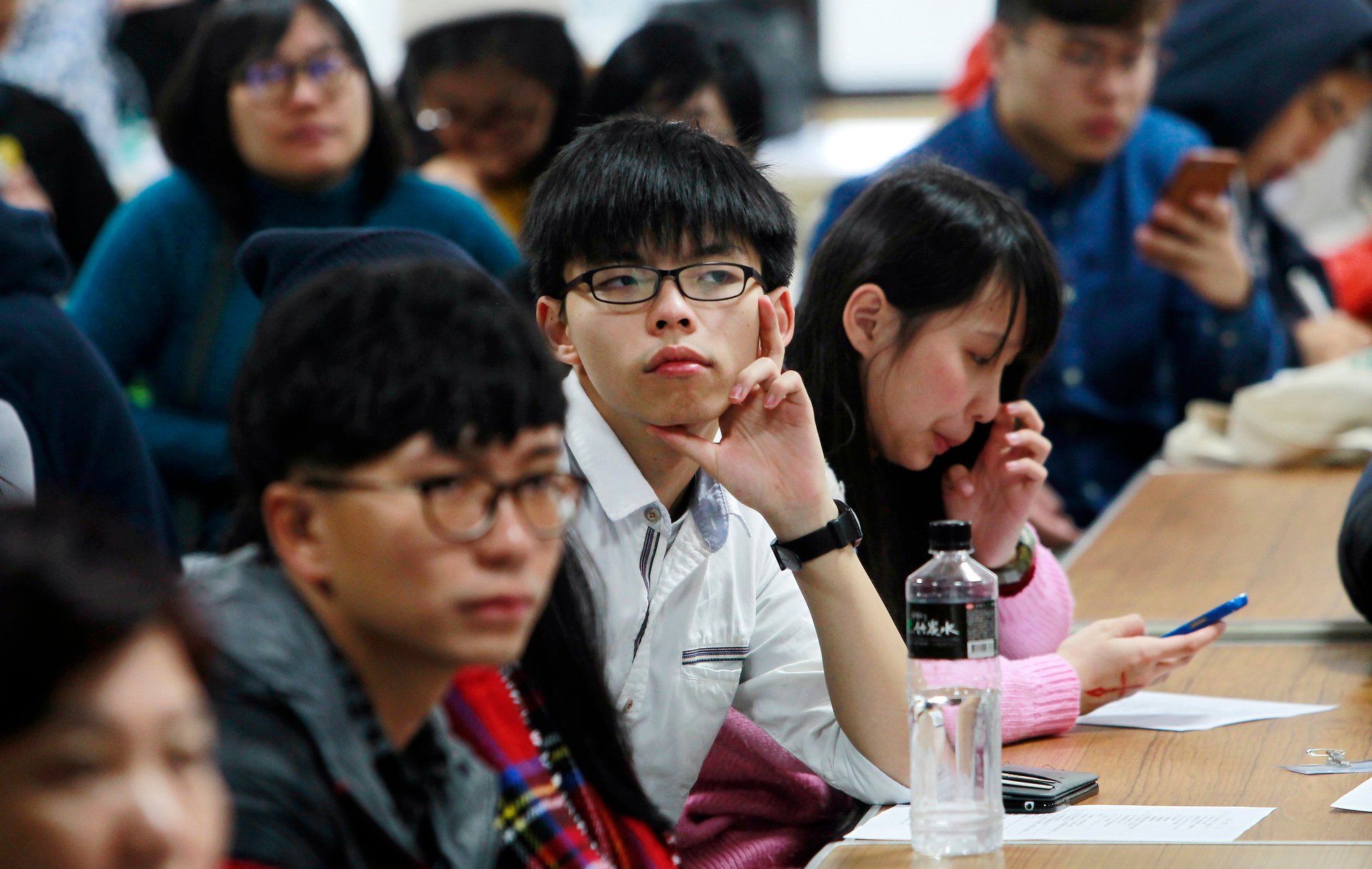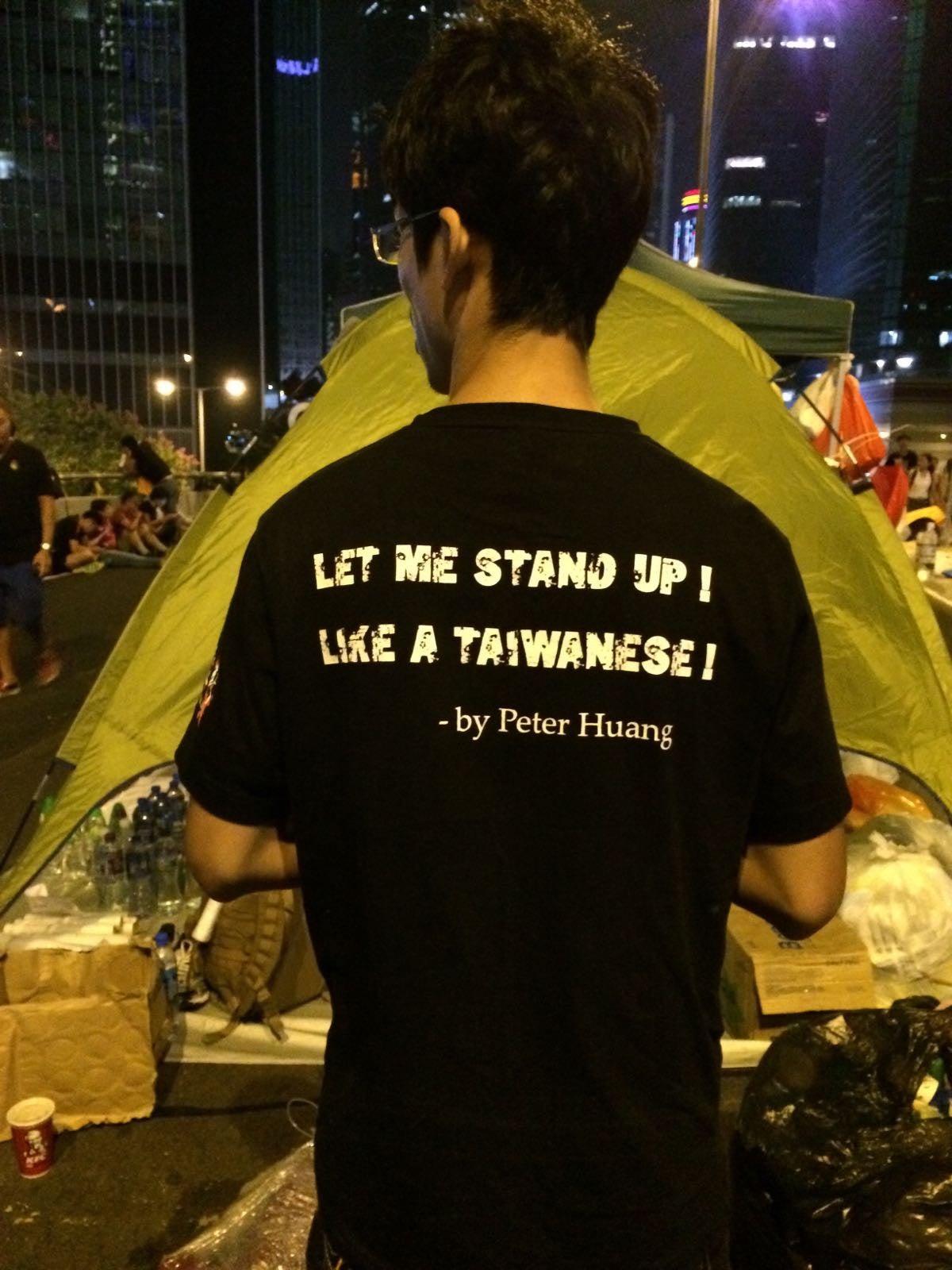Beijing wants to crush youth activists in Taiwan and Hong Kong trying to band together
It was meant to be a small gathering of newly formed political groups in Hong Kong and Taiwan—and indeed the two-day meeting ending Jan. 8 in Taipei might have gone nearly unnoticed, had a group of people with ties to the local mafia and Chinese Communist Party not decided to violently attack the participants.


It was meant to be a small gathering of newly formed political groups in Hong Kong and Taiwan—and indeed the two-day meeting ending Jan. 8 in Taipei might have gone nearly unnoticed, had a group of people with ties to the local mafia and Chinese Communist Party not decided to violently attack the participants.
Former student protest leaders Nathan Law, at 23 Hong Kong’s youngest elected lawmaker, and 20-year-old Joshua Wong, a fellow member of the city’s Demosisto political party, bore the brunt of the attacks. Upon leaving Hong Kong International Airport on Jan. 7, they were heckled by patriotic groups who labeled them as “pro-independence forces”—even though neither Law nor Wong espouse pro-independence views.
The harassment persisted as they arrived in Taipei, where a throng from the “pro-unification” Patriot Association, which advocates for the reunification of Taiwan with China, awaited them at the airport. Numbering in the hundreds, members cried slogans in support of a unified China, and decried both Taiwanese and Hong Kong independence.
According to Wong’s Facebook page, he also had rocks thrown at him (link in Chinese) in Taipei. Throughout their visit, Taiwanese police put the activists under protection. Back in Hong Kong, Law was physically attacked and suffered injuries upon his arrival at the airport.
For years, open thuggery by people allegedly linked to organized crime and the Communist Party have been near commonplace during protests in Hong Kong. The fact that such scenes happened in Taiwan—a separate, democratic jurisdiction that China nonetheless claims as its own—suggests Beijing is paying close attention to links between Hong Kong and Taiwan, and wants to isolate what it sees as “splittists,” a term Beijing typically reserves for activists from the recalcitrant regions of Tibet and Xinjiang.
“A Hong Kong-Taiwan axis makes China very nervous,” said Jean-Pierre Cabestan, a political science professor at Baptist University in Hong Kong. “For the first time, what brings together these activists is a strong anti-China sentiment, not just a pro-democracy one.”
In recent years, emotional and physical ties between Hong Kong and Taiwan have strengthened, especially among the youth of both places. Since 1996, when Taiwan first held democratic presidential elections, Hong Kong people have flocked to Taiwan to observe the kind of leadership elections by universal suffrage that are still denied to them.
Both places underwent momentous protest movements that were in essence about China’s power—in Taiwan, the Sunflower Movement in 2014 fought against an extensive trade pact with China, and later in the year Hong Kong’s Umbrella Movement defied Beijing’s decision not to grant free elections to the city. Taiwanese watched what was happening in Hong Kong in 2014 with the following phrase (paywall) in mind: “Today Hong Kong, tomorrow Taiwan.”
The forum in Taipei was organized by Taiwan’s New Power Party, a political party formed after the Sunflower Movement that now has five members in the legislature. The topic of the forum was “self-determination“—an idea that has a nuanced difference from the “pro-independence” label that Beijing continues to apply to young Hong Kong activists. Conflating the two labels allows Beijing to discredit all activists as radical splittists in one broad stroke, particularly useful after candidates born out of the Umbrella Movement performed well in recent legislative elections in Hong Kong, in a loss of face for Beijing.
At a press conference (link in Chinese) held by China’s Taiwan Affairs Council last month, spokesman An Fengshan said in response to a question about the planned meeting between Taiwan and Hong Kong activists: “It is unacceptable for Taiwanese independence and Hong Kong independence advocates to divide the country,” comparing the activists to “flies” who will eventually die a bloody death after crashing into walls.

Beijing does not want to see activists from what it considers two of the most disobedient parts of China organizing and exchanging ideas on civil disobedience and resistance. It has tried to snuff out these ties in the past by barring Taiwanese protest leaders from entering Hong Kong. It has also managed to pressure some countries, such as Malaysia and Thailand, from allowing Hong Kong activists to enter, but it does not have the same leverage over Taiwan. As such, the rare scenes of mob violence in Taiwan against the Hong Kong visitors mark an escalation in tactics by Beijing.

“Taiwan has seen violence from these same groups before. What is shocking is seeing it directed at overseas guests, including elected legislators who have been invited from Hong Kong,” said Ian Rowen, a post-doctoral fellow researching social movements in China and Taiwan at the Academia Sinica in Taipei. Traditionally, pro-unification groups in Taiwan directed their violent actions against members of the Falun Gong, a spiritual group that Beijing deems a cult and is outlawed in the country.
Taiwanese police have established connections between the protestors and criminal gangs. They arrested a 28-year-old member of the Four Seas Gang, which has links to China and is one of the largest underground criminal gangs in Taiwan, according to local media reports. The son a notorious gang leader is also being questioned by police.
Indeed, ties between organized crime gangs and China have long been established. In 1997, the year Hong Kong was handed over from Great Britain to China, Chinese authorities boasted of having made a deal with the local underworld, saying that there were “many good guys” among them and praising their “patriotism.”
“From my conversations with Chinese dissidents, they believe that this shows Beijing’s discomfort and helplessness at these exchanges between democracy activists,” said Lin Fei-fan, one of the student leaders of Taiwan’s Sunflower Movement and a participant in the Taipei forum. “Beijing is resorting to violence because it’s the only way that they know.”
Lin believes that the common cause shared by activists from Hong Kong and Taiwan is too strong for Beijing’s tactics to produce much of an effect. China will continue to apply its well-oiled and well-funded “United Front” machine in as many places as possible, but it is also discovering that the resistance to its control is getting more determined.
According to Cabestan, the new voices emerging from these recent political movements “are very clearly opposing all that China has been working for.”